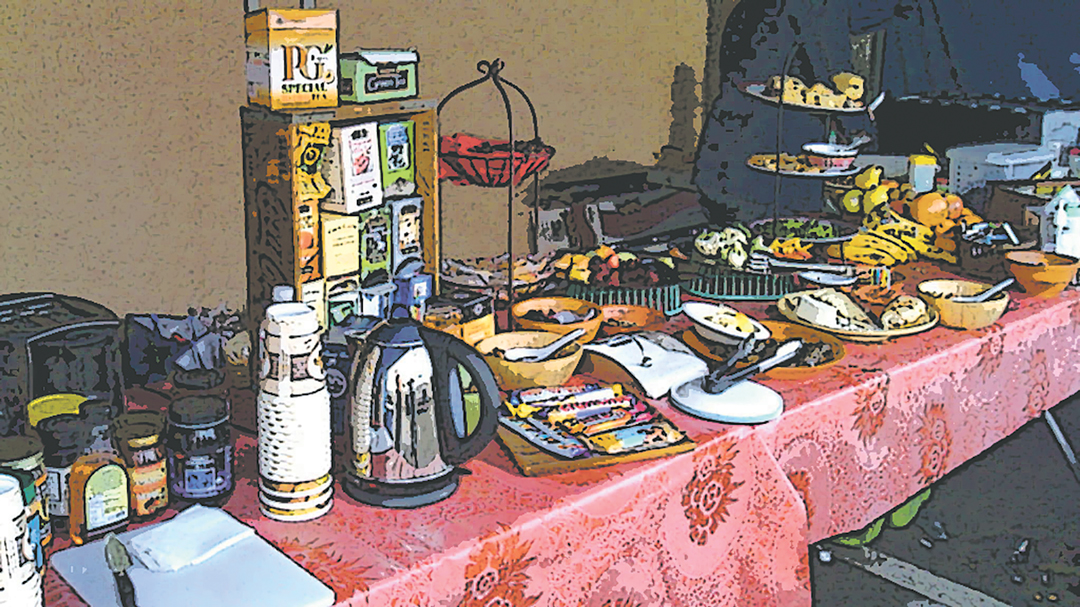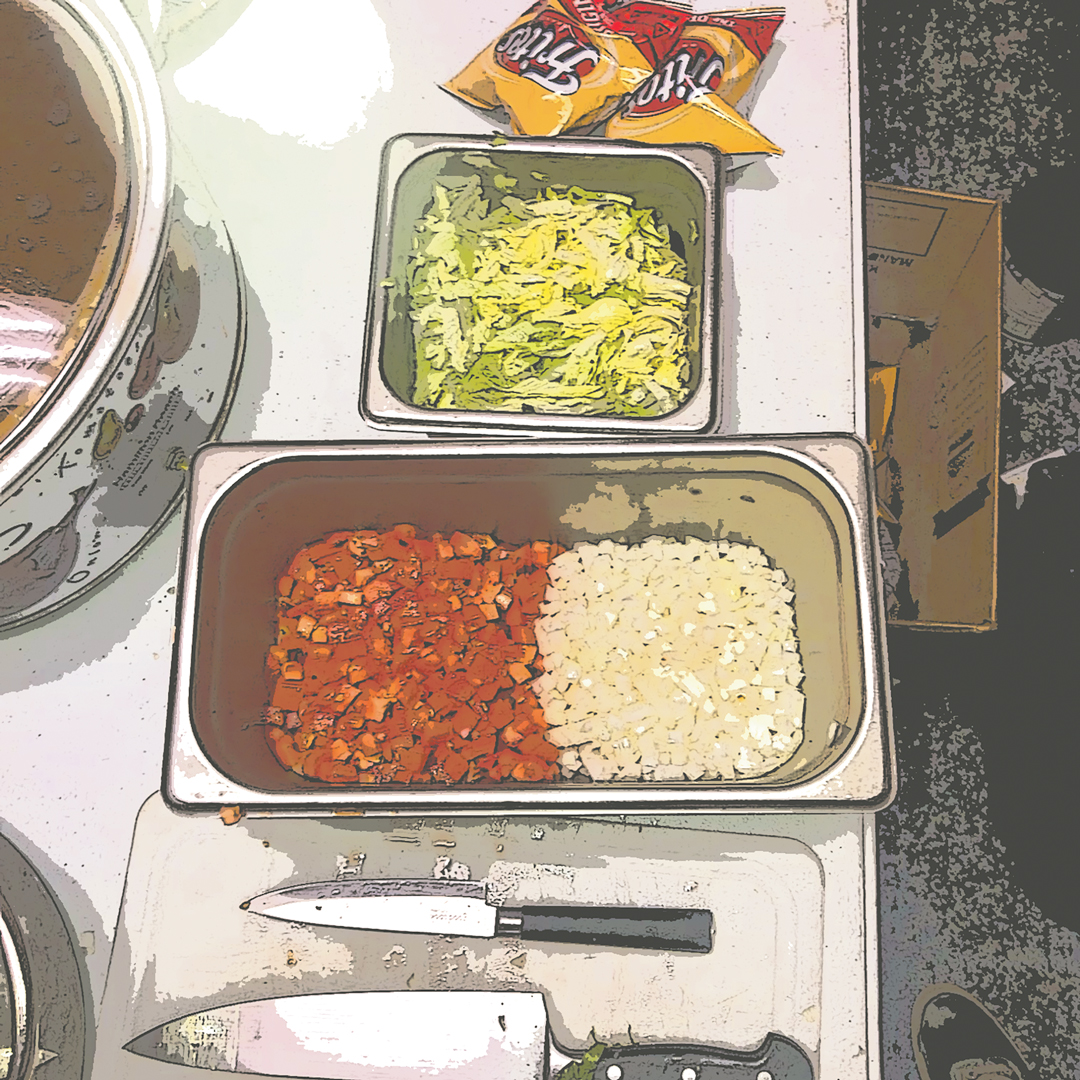Arts and Craft Services
How Hollywood Runs on Snacks
by Candolin Cook

Several years ago, I had an opportunity to work as a background actor, or “extra,” on The Lone Ranger, a big-budget Hollywood Western shot in New Mexico. At the time, I was all too excited to play a nameless saloon girl in a scene taking place at a very Disneyfied brothel. Then, on the third day of filming, the actress playing the brothel’s madam (Helena Bonham Carter) recognized my innate star power and selected me to be her hand double. Suddenly, I went from being the lowest actor on the call sheet to having my own trailer, face time with A-listers, and, most importantly, better meals and unlimited access to snacks—a.k.a “craft services.”
As an extra, the food options hadn’t been great—reheated enchiladas, dry granola bars, even drier chicken. (Luckily, when you’re wearing a corset you aren’t all that hungry anyway.) But after my promotion to “talent,” there were steak and oyster dinners, taco and pizza bars, and breakfast available any time of day. Even now, nearly a decade after my big (and only) break, I still reminisce about the 3 am pancakes and constant trips to the overflowing snack tables. (As it turns out, working on a movie set is painfully boring most of the time and eating really helps fill the long hours waiting around.)
The Lone Ranger went on to be a box-office bomb, thanks in part to its nonsensical plot and a casting choice that was problematic even before lead actor Johnny Depp’s public downfall. But the experience taught me two things: 1) I shouldn’t quit my day job, and 2) the people responsible for feeding a cast and crew are the lifeblood of any production. To better understand the ins and outs of sustaining a set, I met up with Jediah, an events chef and craft services lead who just wrapped on another film shot in Santa Fe.

“Craft services gets its name because we are there to support the ‘crafts’—actors, wardrobe, grips, set designers, etc.,” says Jediah. He explains that, per industry and union guidelines, caterers must provide a cast and crew with full meals every six hours. Craft services professionals, meanwhile, provide all the food and beverages in between. They are in charge of shopping for and stocking the snack tables, assembling midmorning and midafternoon refreshments, and, in some cases, cooking an “evening meal” that can substitute for, or come after, a catered dinner, depending on the time frame.
While “crafties” are there to support the arts, there is also an art to what they do. “I’m constantly reading the room, figuring out what people want and need. There’s a big difference in feeding people who are hungry versus feeding people who are bored,” Jediah says, and he has to be well prepared for both.
Jediah’s eleven-hour workday typically starts with a 6:30 am call time, at which point his most important task is brewing coffee. Then, after the catered breakfast, he’ll start putting out his first round of snacks: nuts, melon, and cambozola on apple slices. “You have to think about food that will energize and keep people [sharp], so I try to stay away from chips and bread and things that weigh you down.” Throughout the day, he is busy filling coolers, getting ice, running to the grocery store, prepping food, and cleaning. Post-lunch, he restocks the tables with everything from New Mexico beef jerky to Jelly Belly candies to canapés. He says he looks for unique items like nectar soft drinks he finds at Middle Eastern markets in Albuquerque, as well as standbys like Diet Coke to keep folks happy and interested. When possible, the locally based chef also likes to give them a taste of New Mexico. “For the evening meals on this shoot, I made nachos and frito pies using homemade pinto beans, and posole with local green chile. All the New Mexico crew appreciated it and it was novel and fun for the out-of-towners.” (He did have to explain to the Hollywood crew what hominy is.)
Not surprisingly, Jediah says there’s a hierarchy on set that extends to the food. For instance, I learned that if I had been part of a union like the Screen Actors Guild when I filmed the The Lone Ranger, I would have been given the good stuff from the start. If you are at the top of the food chain—so to speak—craft services leads will shop with your specific preferences in mind. “I know by day two what brand of sparkling water a certain producer likes or if the lead actress is only eating avocado toast,” Jediah explains. He sometimes also takes care of impromptu requests from those in the position to make them. “If [the director] sends word he wants a Reuben, I drop everything and make a Reuben,” he says. The quicker the VIPs are fed, he explains, the faster and better the whole day goes for everybody. “We’re all there to get the job done.”
Sometimes, however, not everyone on set recognizes that group effort. “A lot of the crew won’t treat me like I’m part of the crew, which is a little bit of a heartbreaker,” Jediah admits. In the same vein, his biggest pet peeve is when non–craft services people disrespect his kitchen. “I’ve had people go through my fridge, even turn off my gas. . . . I would never touch a cameraman’s equipment. I’m [foremost] a chef and I take my work space and protocol seriously.”
Never has the film industry had to take protocols so seriously as it has in the past year. On this last project, Jediah had four rapid COVID tests during a weeklong shoot and worked with a COVID compliance officer to ensure best practices were being followed. Guidelines included no self-service buffet lines or communal platters. While packaging and serving everything individually was more time consuming for Jediah, the convenience of grab-and-go options like crudités skewers were a hit with everyone else. “When you’re used to working [outdoors] or with limited resources, you get good at improvising and adapting,” he says.
Whether a craft services professional is working on a film with a budget of $100 million or $1 million, whether they are cooking out of a commercial kitchen or a golf cart, they are constantly on the move to keep morale and energy high. It may not be the most glamorous job in a work environment filled with movie stars, but it’s one critical to a production’s success. ,
To find out more about Jediah’s catering and events, visit dlcbevents.com.

Candolin Cook
Candolin Cook is a historian, writer, editor, and former co-editor ofedible New Mexico.She recently received her doctorate in history from the University of New Mexico and is working on her first book.

